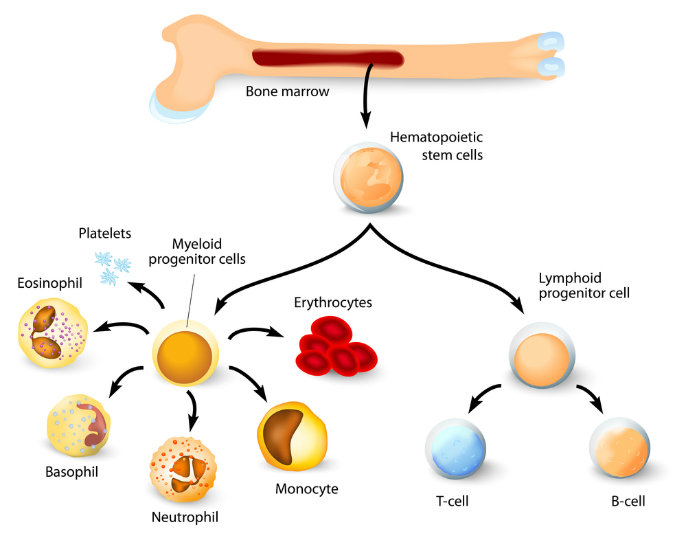Myeloproliferative Neoplasms (MPNs)

Overview
Myeloproliferative neoplasms (MPNs) are a group of chronic blood cancers where the bone marrow makes too many red cells, white cells, or platelets. They are linked to mutations in genes such as JAK2, CALR, and MPL, and may remain stable for years or progress to myelofibrosis or acute leukemia.
The three main types of classic MPNs are:
- Polycythemia vera (PV) – too many red blood cells
- Essential thrombocythemia (ET) – too many platelets
- Primary myelofibrosis (PMF) – scarring of the bone marrow
Symptoms
- Fatigue
- Headache or dizziness
- Itchy skin (especially after hot shower)
- Easy bruising or bleeding
- Enlarged spleen (abdominal fullness)
- Night sweats or weight loss
- Blood clots or bleeding events
Causes & Risk Factors
- Age (most common after age 60)
- Acquired gene mutations (e.g., JAK2 V617F)
- Family history of MPNs (rare)
- Prior exposure to radiation or chemicals (suspected)
Diagnosis
- Complete blood count (CBC)
- Blood smear and bone marrow biopsy
- JAK2, CALR, MPL mutation testing
- Erythropoietin level (for PV)
- Imaging (ultrasound of spleen)
Treatment Options
- Phlebotomy (for PV to reduce hematocrit)
- Low-dose aspirin (to prevent clots)
- Cytoreductive therapy (e.g., hydroxyurea, interferon-alpha)
- JAK inhibitors (e.g., ruxolitinib for myelofibrosis)
- Stem cell transplant (in select high-risk cases)
Prognosis
- Varies by type and risk score
- PV and ET: may live for decades with proper management
- PMF: variable prognosis, some patients progress to acute leukemia
- Risk stratification tools help guide therapy
Living with this Cancer Type
- Regular monitoring of blood counts and spleen size
- Symptom management (itching, fatigue, clotting)
- Lifestyle changes to reduce cardiovascular risk
- Mental health support for chronic illness coping
Prevention & Screening
- No known prevention methods
- Routine screening not recommended unless family history or symptoms
FAQs
Q: Are MPNs a type of cancer?
A: Yes, they are chronic blood cancers with a variable course.
Q: Can MPNs become leukemia?
A: In some cases, especially PMF, they can transform into acute leukemia.
Q: Can I live a normal life with MPN?
A: Many patients, especially with PV or ET, live normal or near-normal lifespans.
Resources
- MPN Research Foundation (mpnrf.org)
- Leukemia & Lymphoma Society
- ClinicalTrials.gov
Understand Precision Testing
Learn how liquid biopsy and chemo sensitivity testing can personalize your treatment plan.
Make Informed Decisions
Gain knowledge to actively participate in treatment discussions with your healthcare team.
Improve Treatment Outcomes
Discover how precision medicine and metabolic therapies can enhance treatment effectiveness.
Start Your Educational Journey Today
Empower yourself with knowledge about precision metabolic oncology and take an active role in your cancer care journey.
Need More Information?
Our team of oncology experts is here to help you understand your diagnosis and treatment options.
